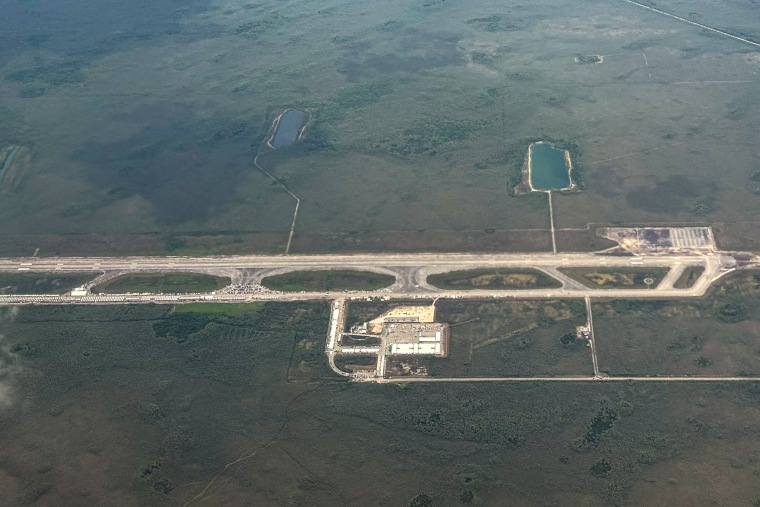MIAMI — A federal judge in Miami ruled Thursday that “Alligator Alcatraz,” the contested migrant detention facility in the Florida Everglades, can remain operational for now, but it cannot be expanded and no additional detainees can be brought in.
U.S. District Judge Kathleen M. Williams entered a preliminary injunction to prevent the installation of any additional industrial-style lighting and any site expansion. Her ruling further prevents “bringing any additional persons… who were not already being detained at the site at the time of this order.”
The ruling was filed late Thursday, allowing the injunction that was requested over National Environmental Policy Act violations.
Within 60 days, the facility must also remove “all generators, gas, sewage, and other waste and waste receptacles that were installed to support this project,” the 82-page ruling said. It’s unclear how the facility will remain operational if those resources are removed.
The government must also remove temporary fencing installed to allow Native American tribe members access to the site consistent with the access they had before the facility was erected.
The Justice Department did not immediately respond to a request for comment. The offices of Florida Gov. Ron DeSantis and the Florida Division of Emergency Management also did not immediately respond to requests for comment.
Williams’ decision came down the same day a temporary construction freeze she previously issued expired, and after a four-day hearing over environmental concerns regarding the facility’s location in the sensitive wetlands.
Williams had issued a temporary restraining order earlier this month to temporarily halt operations over a lawsuit alleging the detention facility’s construction skirted environmental laws. That ruling meant no filling, paving, or installation of additional infrastructure was allowed, but did not impact the center’s immigration enforcement activity.
Environmental groups sued in June to stop the facility, which opened in July on an airstrip in Ochopee’s Big Cypress National Preserve.
The suit stated that the center was built without ecological reviews required under the National Environmental Policy Act and without public notice or comment, and that the government failed to comply with other state and federal statutes, including the Endangered Species Act.
The Trump administration argued that the facility was necessary because voters want the federal government to curb illegal immigration and downplayed the environmental concerns.
Paul Schweip, an attorney representing the plaintiff, said in court on Aug. 13 that the “suggestion there is no environmental impact is absurd.”
“So why here? There are runways elsewhere … Why the jetport in this area?” Schweip asked. “Alligator Alcatraz. A name just meant to sound ominous. I would submit, judge, this is just a public relations stunt.”
Environmental groups and Native Americans had protested the construction of the site, which is part of the Trump administration’s crackdown on immigration, because of the Everglades’ delicate and unique ecosystem, which is home to endangered and threatened species.

On Aug. 12, the court heard from Amy Castaneda, director of Water Resources for the Miccosukee Tribe of Indians of Florida. Castaneda said she’s worked with the tribe for 19 years, and the entrance to the jetport where the facility is built is a quarter-mile from the tribe’s land.
When asked what the Everglades land means to the Miccosukee tribe, she replied, “It’s written into the constitution to protect the Everglades because the Everglades protected them when they were hunted by the government.”
Castaneda said that for nearly two decades, there’s been “minimal” activity at the jetport, but that changed after June with the construction of the detention facility.
“There’s much more activity there, vehicles going in and out, cars usually isolated on the southside of Tamiami trail taking photos with the sign. Tankers, protesters, media, people setting up tents to sell merch for Alligator Alcatraz. Just different levels,” she said.
Castaneda said no one from the federal government, state, or any governmental entity contacted the tribe regarding the construction.
She said that water resources for the tribe have collected samples downstream from the facility to test and determine if there’s been a nutrient shift or potential health concerns.
Marcel Bozas, the director of Fish and Wildlife for the Miccosukee Tribe of Indians of Florida, also testified Aug. 12, noting the airstrip is a couple of miles from the tribe’s sites.
While tribal members can’t access the airstrip, some trails are no longer accessible. When asked about the impact of hunting on the land, Bozas said, “Tribal members are concerned the wildlife they could be formerly hunting for are no longer in that area.” There’s also concern that medicinal plants are impacted.


